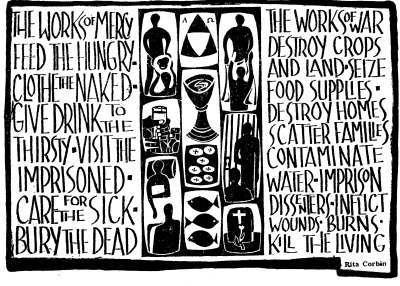
March 1997 v.p. Norman Searah Sentenced p. 1
Cordaro, VP, Vol. 21, No. 2, 1997, Norman Searah Sentenced
March 1997 v.p. Norman Searah Sentenced p. 1
NORMAN SEARAH SENTENCED TO FIVE YEARS PROBATON AND TOLD TO APOLOGIZE TO STRATCOM COMMANDER
By Frank Cordaro and Michael Sprong
Norman Searah, of the Des Moines Catholic Worker Community, is the latest StratCom resister to face an increasingly punitive Federal court in Omaha, Nebraska. Supported by nearly 20 friends and co-workers, Norman appeared on Friday, May 9, 1997, before U.S. Magistrate, Kathleen Jaudzemis. Norman was represented by attorney Chuck Hannan. Major Thomas Helget USAF was the prosecuting attorney.
Originally scheduled as a trial on the charge against Norman of illegal reentry at StratCom Headquarters, the proceedings began instead with a hearing to determine whether Jaudzemis would accept Norman’s change of pleas from not guilty to guilty. After posing several questions to Norman and after reminding him of his right to trial, the magistrate accepted the guilty plea and proceeded to the sentencing phase.
Chuck Hannan, Norman’s attorney, spoke first on Norman’s behalf. He emphasized Norman’s many years of service at the Des Moines Catholic Worker and his commitment to a lifestyle of voluntary poverty. He told the judge that Norman was as close to a “Mother Teresa” as the judge was ever going to see in her courtroom. He said that, because Norman’s life is one of community service, sending him to jail would serve no purpose.
Following his lawyer’s comments, Norman was given the opportunity to speak on his own behalf before sentence was passed. As Norman distributed typed copies of his prepared statement to the magistrate and prosecutor, Jaudzemis interrupted and produced a hand-written document that Norman had previously submitted to the Federal Pretrial Release Office in Omaha for the purpose of a pre-sentence report. The magistrate insisted that the style and composition of the two documents was too dissimilar to have been written by the same person.
The magistrate’s tone of voice, which previously alternated between matter-of-fact and condescending, turned angry as she insisted that it was impossible for Norman to have drafted both documents. She questioned Norman: “Did you have any help writing this (sentencing) statement?” Norman replied that he did receive editorial assistance from Frank Cordaro (Fr. Frank). However, Norman added, the statement was fully his own.
Bristling, Jaudzemis rejected the prepared statement, adding, “I’m not interested in Fr. Frank’s statement. I want to hear what you have to say.” She then ordered Norman to make his statement extemporaneously. Surprised and shocked, Norman complied and delivered an eloquent defense of his actions, covering many of the points he had raised in his prepared statement. “I want to pass on something good for future generations,” he stated. Norman added that his faith and a desire to act in defense of creation motivated him to enter the property of Offutt Air Force Base in witness against nuclear weapons.
The next to speak was Major Thomas Helget USAF, the prosecuting attorney, who began his statement by telling how surprised he was couple years ago when he first arrived at Offutt, to learn that a priest (Frank Cordaro) was in jail for protesting at the base. Then how surprised he was that the next guy to be sent to jail for protesting at StratCom was a blind guy (Sam Days). “And now,” he said, shaking his head, I’m prosecuting Mr. Searah.” Positioning himself in the tiny courtroom so he could address both the magistrate and Norman’s supporters, Major Helget said, “This crossing the line again and again has got to stop! Something is terribly wrong here!”
Caught in the rhetorical moment, Jo Peterson, from the gallery, began to clap her hands and said, “Yes, there certainly is.” Before she could say anything else, the judge broke in and ordered, “One more word from you (pointing to Jo) and I will hold you in contempt.” The judge immediately ordered Jo out of the court room, along with Kathleen Granger and her infant son, Joseph, though Joseph was causing no disruption
Major Helget concluded his statement by recommending a light sentence of only one month’s incarceration and a short term of probation. The, in an unusual display from the bench, the magistrate turned to those in the gallery and leveled several accusations, at one point labeling them all cowards who had “sent” Norman to do their “dirty work” and suffer the consequences. This way, she concluded, none of them would have to risk their own jobs and material possessions.
The magistrate then turned to Norman and, as the amazed assembly listened, lectured Norman about how he was being manipulated by his so called friends and that he was only a “pawn” in their game of protesting.
After her admonition to Norman regarding his choice of friends, Jaudzemis meted out a six-month suspended sentence with five years of unsupervised probation. Additionally, Norman cannot violate any laws or engage in any acts of civil disobedience. He is also ordered to write a letter of apology to both Major Helget and the base commander of Offutt Air Force Base within thirty days. After delivering the sentence, Judge Jaudzemis immediately left the courtroom.
During comments made after sentencing, Norman said that the highly personal nature of the magistrate’s accusations caught him and his supporters by surprise.
